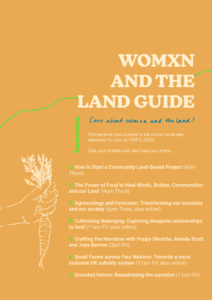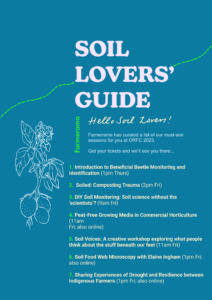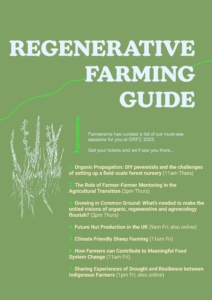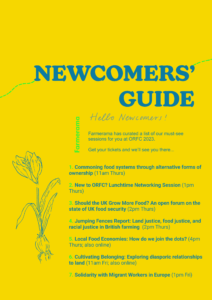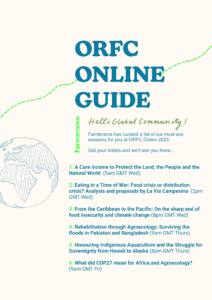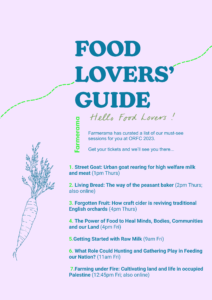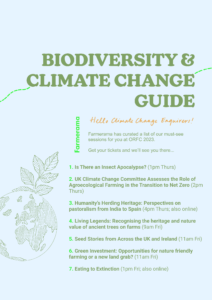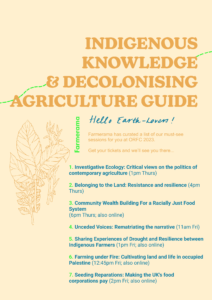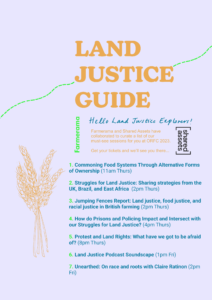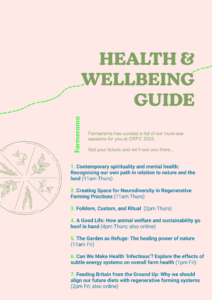We are delighted to once again welcome Faramerama Radio as a media partner for ORFC 2023. Explore their guides to #ORFC23 and read about their recent project, Cultivating Justice.
- Womxn and the Land Guide
- Soil Lovers’ Guide
- Regenerative Farming Guide
- Newcomers’ Guide
- ORFC Online Guide
- Food Lovers’ Guide
- Biodiversity & Climate Guide
- Indigenous Knowledge Guide
- Land Justice Guide
- Health and Wellbeing Guide
Cultivating Justice
“You cannot be what you cannot see” Marian Wright Edelman
Our award-winning media partner, Farmerama Radio celebrates underrepresented voices in agroecological food and farming – the stories and experiences of women, non-binary people, BPOC, LGBTQIA+ and neurodiverse farmers and landworkers.
Cultivating Justice, their six-part series produced in collaboration with Land In Our Names and Out on the Land (part of The Landworker’s Alliance) weaves together interviews, conversations, music and reflections from Black people, people of colour, trans people, queer people and women, on their relationships with land, growing, and identity.
The series presents an opportunity to introduce a new narrative in British farming, celebrating and recognising these groups and voices while exploring themes such as care, inclusivity and equity in (land)work, and how growing, preparing and eating food can be a way of healing trauma and connecting to community and ancestry.
As part of a wider project funded by Farming the Future and The Roddick Foundation, Cultivating Justice aims to address inequalities in agriculture, horticulture and the environment sectors – professions in Britain that all have over 90% white British employees. Large disparities also exist in land ownership and access to green spaces, with communities under the ‘BAME’ umbrella being 60% less likely than their white counterparts to be able to access green spaces and natural environments (Natural England).
Three of the groups most affected by these disparities are Black people and people of colour (BPOC), LGBTQIA+ people, and women. Women are doing 43% of global agricultural labour, and their work is fundamental in developing agroecology. Despite this, women in agriculture receive lower salaries, fewer training opportunities, and are less likely to access land as individuals. Far-right groups have historically enjoyed high levels of support in rural areas, a factor of rural life which often puts ethnic, gender and sexual minority groups at risk.
There is a lack of BPOC and queer support networks within all agriculture sectors. The phrase ‘you cannot be what you cannot see’ (Marian Wright Edelman) is relevant; in the absence of representation, it is difficult for many BPOC, women and LGBTQIA+ people to imagine a land-based livelihood. Actively building support networks and uplifting stories from these groups plays an essential role in challenging these inequalities.
Hear from Farmerama and ORFC’s own Dora Taylor sharing insights from her Masters research on the experiences of Black farmers in the UK; Natalie Tamburrini tells us her experience as an autistic person working on a livestock farm and considers how employers can better understand the needs of neurodiverse farmers; we head to Rock Steady Farm – a Queer-owned and -run farm in upstate New York – to hear how Maggie Cheney is integrating care into their landwork while acknowledging and dealing with conflict, and much more.
Professor Corinne Fowler, research expert at the University of Leicester, and director of Colonial Countryside: National Trust Houses Reinterpreted project, and Sam Siva, Land In our Names, reflect on how the agroecological land and food movement in Britain can reckon with its colonial history – and what the future could look like.
Cultivating Justice is available to listen on all major podcast platforms.


